Strategic Human Resource Management: An Analysis of Career Management
VerifiedAdded on 2023/06/04
|13
|4641
|180
Essay
AI Summary
This essay delves into the realm of strategic human resource management (SHRM), focusing on career management and its various facets. It explores the distinctions between individual and organizational career management, emphasizing their significance in achieving business objectives. The essay synthesizes insights from multiple articles, discussing career development, career adaptability, and employee satisfaction. It analyzes how factors such as proactive personality, organizational culture, and leader-member exchange influence career satisfaction. The essay also examines the role of organizational career management in high-performing companies, discussing its dimensions and the challenges of investing in career development during uncertain times. The analysis highlights the importance of career management for both individual employees and organizations, providing a comprehensive overview of the topic.
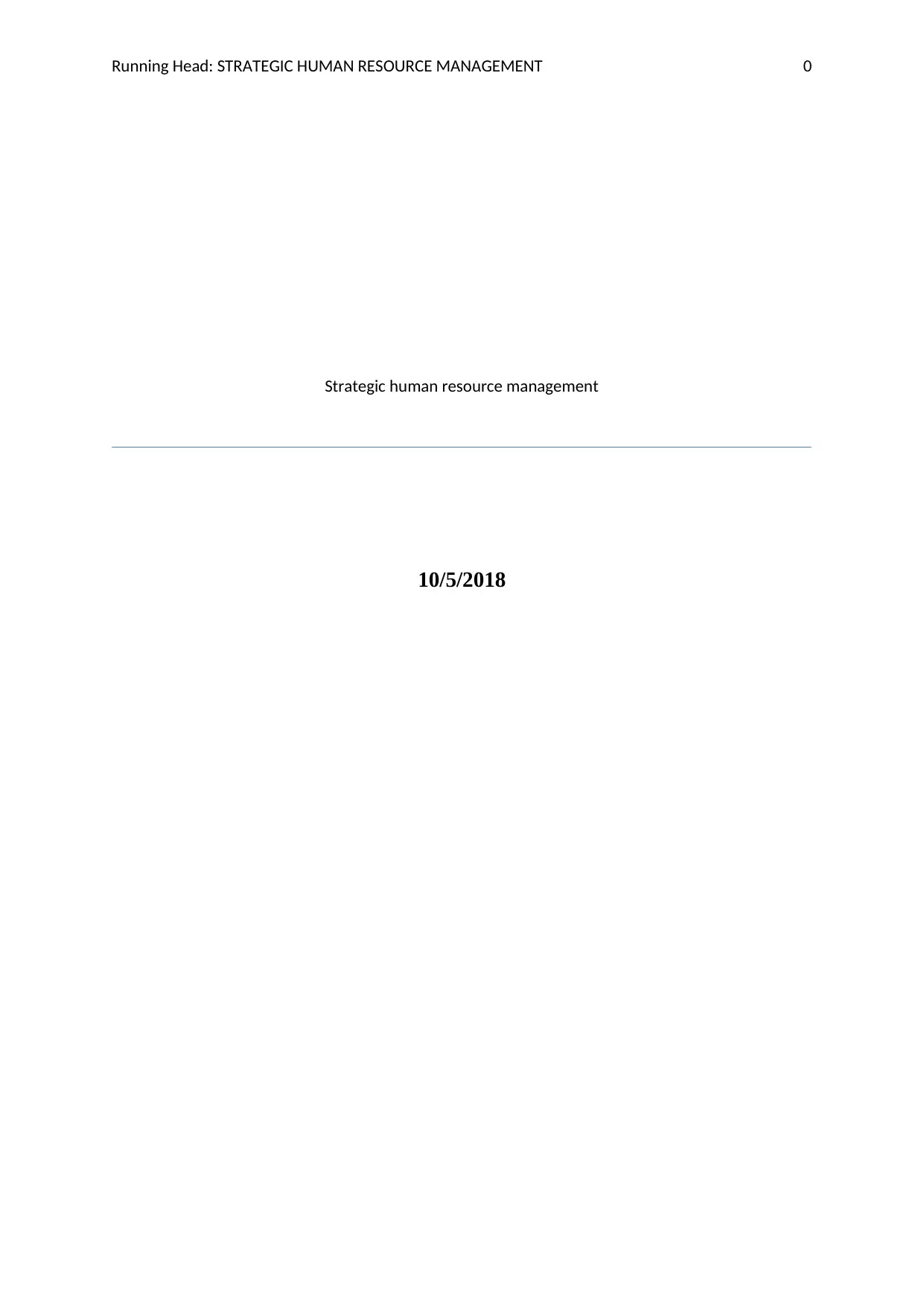
Running Head: STRATEGIC HUMAN RESOURCE MANAGEMENT 0
Strategic human resource management
10/5/2018
Strategic human resource management
10/5/2018
Paraphrase This Document
Need a fresh take? Get an instant paraphrase of this document with our AI Paraphraser
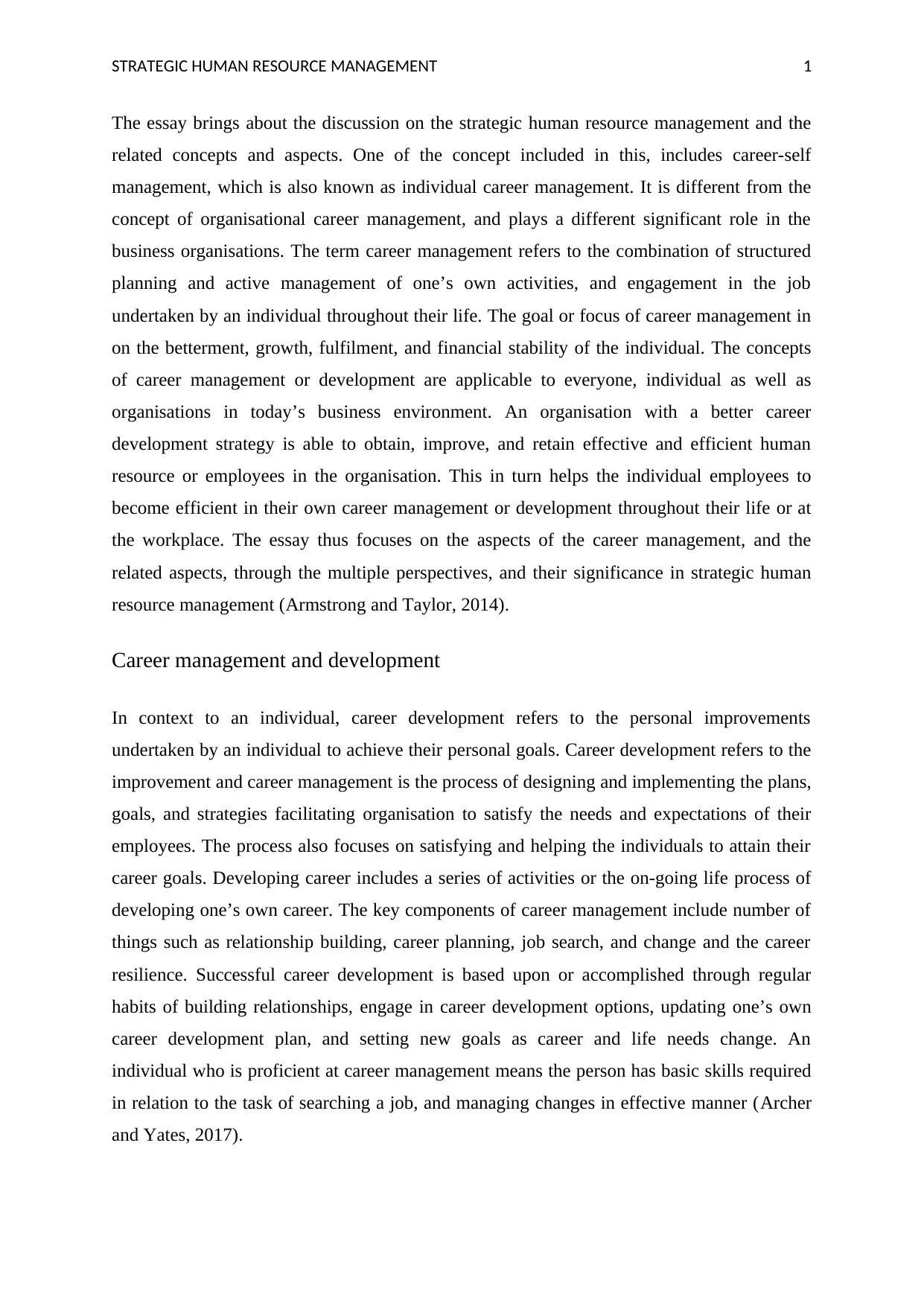
STRATEGIC HUMAN RESOURCE MANAGEMENT 1
The essay brings about the discussion on the strategic human resource management and the
related concepts and aspects. One of the concept included in this, includes career-self
management, which is also known as individual career management. It is different from the
concept of organisational career management, and plays a different significant role in the
business organisations. The term career management refers to the combination of structured
planning and active management of one’s own activities, and engagement in the job
undertaken by an individual throughout their life. The goal or focus of career management in
on the betterment, growth, fulfilment, and financial stability of the individual. The concepts
of career management or development are applicable to everyone, individual as well as
organisations in today’s business environment. An organisation with a better career
development strategy is able to obtain, improve, and retain effective and efficient human
resource or employees in the organisation. This in turn helps the individual employees to
become efficient in their own career management or development throughout their life or at
the workplace. The essay thus focuses on the aspects of the career management, and the
related aspects, through the multiple perspectives, and their significance in strategic human
resource management (Armstrong and Taylor, 2014).
Career management and development
In context to an individual, career development refers to the personal improvements
undertaken by an individual to achieve their personal goals. Career development refers to the
improvement and career management is the process of designing and implementing the plans,
goals, and strategies facilitating organisation to satisfy the needs and expectations of their
employees. The process also focuses on satisfying and helping the individuals to attain their
career goals. Developing career includes a series of activities or the on-going life process of
developing one’s own career. The key components of career management include number of
things such as relationship building, career planning, job search, and change and the career
resilience. Successful career development is based upon or accomplished through regular
habits of building relationships, engage in career development options, updating one’s own
career development plan, and setting new goals as career and life needs change. An
individual who is proficient at career management means the person has basic skills required
in relation to the task of searching a job, and managing changes in effective manner (Archer
and Yates, 2017).
The essay brings about the discussion on the strategic human resource management and the
related concepts and aspects. One of the concept included in this, includes career-self
management, which is also known as individual career management. It is different from the
concept of organisational career management, and plays a different significant role in the
business organisations. The term career management refers to the combination of structured
planning and active management of one’s own activities, and engagement in the job
undertaken by an individual throughout their life. The goal or focus of career management in
on the betterment, growth, fulfilment, and financial stability of the individual. The concepts
of career management or development are applicable to everyone, individual as well as
organisations in today’s business environment. An organisation with a better career
development strategy is able to obtain, improve, and retain effective and efficient human
resource or employees in the organisation. This in turn helps the individual employees to
become efficient in their own career management or development throughout their life or at
the workplace. The essay thus focuses on the aspects of the career management, and the
related aspects, through the multiple perspectives, and their significance in strategic human
resource management (Armstrong and Taylor, 2014).
Career management and development
In context to an individual, career development refers to the personal improvements
undertaken by an individual to achieve their personal goals. Career development refers to the
improvement and career management is the process of designing and implementing the plans,
goals, and strategies facilitating organisation to satisfy the needs and expectations of their
employees. The process also focuses on satisfying and helping the individuals to attain their
career goals. Developing career includes a series of activities or the on-going life process of
developing one’s own career. The key components of career management include number of
things such as relationship building, career planning, job search, and change and the career
resilience. Successful career development is based upon or accomplished through regular
habits of building relationships, engage in career development options, updating one’s own
career development plan, and setting new goals as career and life needs change. An
individual who is proficient at career management means the person has basic skills required
in relation to the task of searching a job, and managing changes in effective manner (Archer
and Yates, 2017).
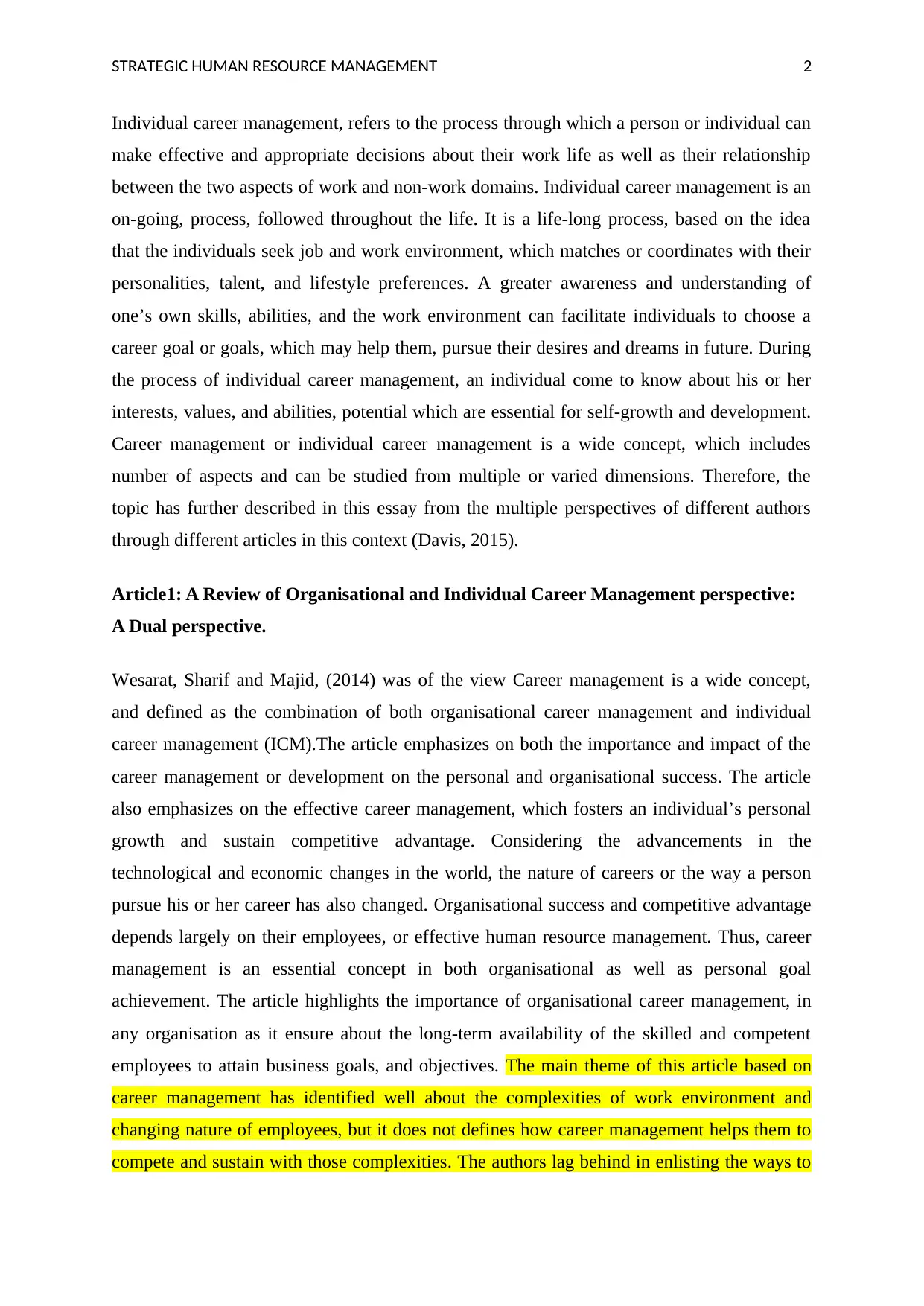
STRATEGIC HUMAN RESOURCE MANAGEMENT 2
Individual career management, refers to the process through which a person or individual can
make effective and appropriate decisions about their work life as well as their relationship
between the two aspects of work and non-work domains. Individual career management is an
on-going, process, followed throughout the life. It is a life-long process, based on the idea
that the individuals seek job and work environment, which matches or coordinates with their
personalities, talent, and lifestyle preferences. A greater awareness and understanding of
one’s own skills, abilities, and the work environment can facilitate individuals to choose a
career goal or goals, which may help them, pursue their desires and dreams in future. During
the process of individual career management, an individual come to know about his or her
interests, values, and abilities, potential which are essential for self-growth and development.
Career management or individual career management is a wide concept, which includes
number of aspects and can be studied from multiple or varied dimensions. Therefore, the
topic has further described in this essay from the multiple perspectives of different authors
through different articles in this context (Davis, 2015).
Article1: A Review of Organisational and Individual Career Management perspective:
A Dual perspective.
Wesarat, Sharif and Majid, (2014) was of the view Career management is a wide concept,
and defined as the combination of both organisational career management and individual
career management (ICM).The article emphasizes on both the importance and impact of the
career management or development on the personal and organisational success. The article
also emphasizes on the effective career management, which fosters an individual’s personal
growth and sustain competitive advantage. Considering the advancements in the
technological and economic changes in the world, the nature of careers or the way a person
pursue his or her career has also changed. Organisational success and competitive advantage
depends largely on their employees, or effective human resource management. Thus, career
management is an essential concept in both organisational as well as personal goal
achievement. The article highlights the importance of organisational career management, in
any organisation as it ensure about the long-term availability of the skilled and competent
employees to attain business goals, and objectives. The main theme of this article based on
career management has identified well about the complexities of work environment and
changing nature of employees, but it does not defines how career management helps them to
compete and sustain with those complexities. The authors lag behind in enlisting the ways to
Individual career management, refers to the process through which a person or individual can
make effective and appropriate decisions about their work life as well as their relationship
between the two aspects of work and non-work domains. Individual career management is an
on-going, process, followed throughout the life. It is a life-long process, based on the idea
that the individuals seek job and work environment, which matches or coordinates with their
personalities, talent, and lifestyle preferences. A greater awareness and understanding of
one’s own skills, abilities, and the work environment can facilitate individuals to choose a
career goal or goals, which may help them, pursue their desires and dreams in future. During
the process of individual career management, an individual come to know about his or her
interests, values, and abilities, potential which are essential for self-growth and development.
Career management or individual career management is a wide concept, which includes
number of aspects and can be studied from multiple or varied dimensions. Therefore, the
topic has further described in this essay from the multiple perspectives of different authors
through different articles in this context (Davis, 2015).
Article1: A Review of Organisational and Individual Career Management perspective:
A Dual perspective.
Wesarat, Sharif and Majid, (2014) was of the view Career management is a wide concept,
and defined as the combination of both organisational career management and individual
career management (ICM).The article emphasizes on both the importance and impact of the
career management or development on the personal and organisational success. The article
also emphasizes on the effective career management, which fosters an individual’s personal
growth and sustain competitive advantage. Considering the advancements in the
technological and economic changes in the world, the nature of careers or the way a person
pursue his or her career has also changed. Organisational success and competitive advantage
depends largely on their employees, or effective human resource management. Thus, career
management is an essential concept in both organisational as well as personal goal
achievement. The article highlights the importance of organisational career management, in
any organisation as it ensure about the long-term availability of the skilled and competent
employees to attain business goals, and objectives. The main theme of this article based on
career management has identified well about the complexities of work environment and
changing nature of employees, but it does not defines how career management helps them to
compete and sustain with those complexities. The authors lag behind in enlisting the ways to
⊘ This is a preview!⊘
Do you want full access?
Subscribe today to unlock all pages.

Trusted by 1+ million students worldwide
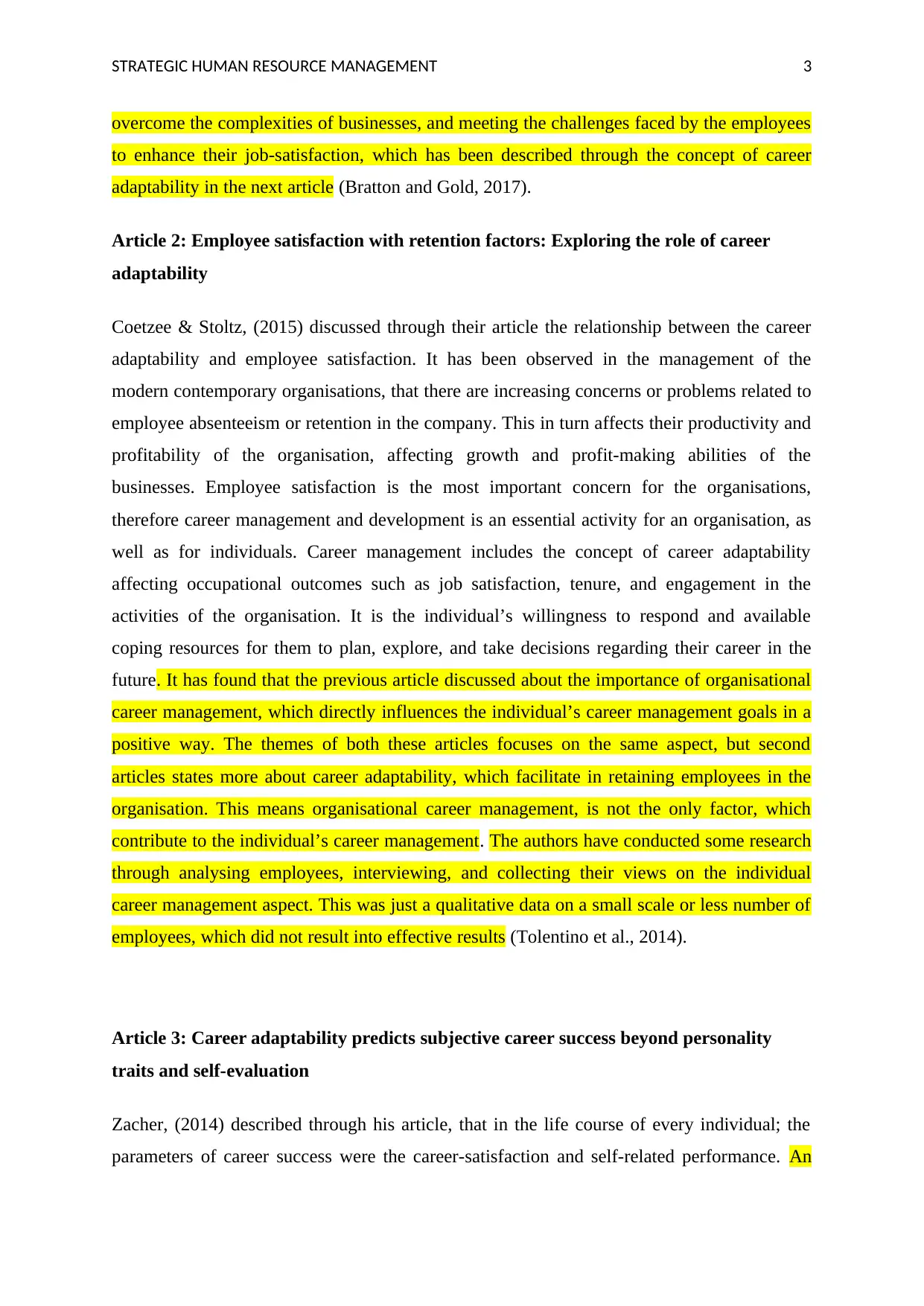
STRATEGIC HUMAN RESOURCE MANAGEMENT 3
overcome the complexities of businesses, and meeting the challenges faced by the employees
to enhance their job-satisfaction, which has been described through the concept of career
adaptability in the next article (Bratton and Gold, 2017).
Article 2: Employee satisfaction with retention factors: Exploring the role of career
adaptability
Coetzee & Stoltz, (2015) discussed through their article the relationship between the career
adaptability and employee satisfaction. It has been observed in the management of the
modern contemporary organisations, that there are increasing concerns or problems related to
employee absenteeism or retention in the company. This in turn affects their productivity and
profitability of the organisation, affecting growth and profit-making abilities of the
businesses. Employee satisfaction is the most important concern for the organisations,
therefore career management and development is an essential activity for an organisation, as
well as for individuals. Career management includes the concept of career adaptability
affecting occupational outcomes such as job satisfaction, tenure, and engagement in the
activities of the organisation. It is the individual’s willingness to respond and available
coping resources for them to plan, explore, and take decisions regarding their career in the
future. It has found that the previous article discussed about the importance of organisational
career management, which directly influences the individual’s career management goals in a
positive way. The themes of both these articles focuses on the same aspect, but second
articles states more about career adaptability, which facilitate in retaining employees in the
organisation. This means organisational career management, is not the only factor, which
contribute to the individual’s career management. The authors have conducted some research
through analysing employees, interviewing, and collecting their views on the individual
career management aspect. This was just a qualitative data on a small scale or less number of
employees, which did not result into effective results (Tolentino et al., 2014).
Article 3: Career adaptability predicts subjective career success beyond personality
traits and self-evaluation
Zacher, (2014) described through his article, that in the life course of every individual; the
parameters of career success were the career-satisfaction and self-related performance. An
overcome the complexities of businesses, and meeting the challenges faced by the employees
to enhance their job-satisfaction, which has been described through the concept of career
adaptability in the next article (Bratton and Gold, 2017).
Article 2: Employee satisfaction with retention factors: Exploring the role of career
adaptability
Coetzee & Stoltz, (2015) discussed through their article the relationship between the career
adaptability and employee satisfaction. It has been observed in the management of the
modern contemporary organisations, that there are increasing concerns or problems related to
employee absenteeism or retention in the company. This in turn affects their productivity and
profitability of the organisation, affecting growth and profit-making abilities of the
businesses. Employee satisfaction is the most important concern for the organisations,
therefore career management and development is an essential activity for an organisation, as
well as for individuals. Career management includes the concept of career adaptability
affecting occupational outcomes such as job satisfaction, tenure, and engagement in the
activities of the organisation. It is the individual’s willingness to respond and available
coping resources for them to plan, explore, and take decisions regarding their career in the
future. It has found that the previous article discussed about the importance of organisational
career management, which directly influences the individual’s career management goals in a
positive way. The themes of both these articles focuses on the same aspect, but second
articles states more about career adaptability, which facilitate in retaining employees in the
organisation. This means organisational career management, is not the only factor, which
contribute to the individual’s career management. The authors have conducted some research
through analysing employees, interviewing, and collecting their views on the individual
career management aspect. This was just a qualitative data on a small scale or less number of
employees, which did not result into effective results (Tolentino et al., 2014).
Article 3: Career adaptability predicts subjective career success beyond personality
traits and self-evaluation
Zacher, (2014) described through his article, that in the life course of every individual; the
parameters of career success were the career-satisfaction and self-related performance. An
Paraphrase This Document
Need a fresh take? Get an instant paraphrase of this document with our AI Paraphraser
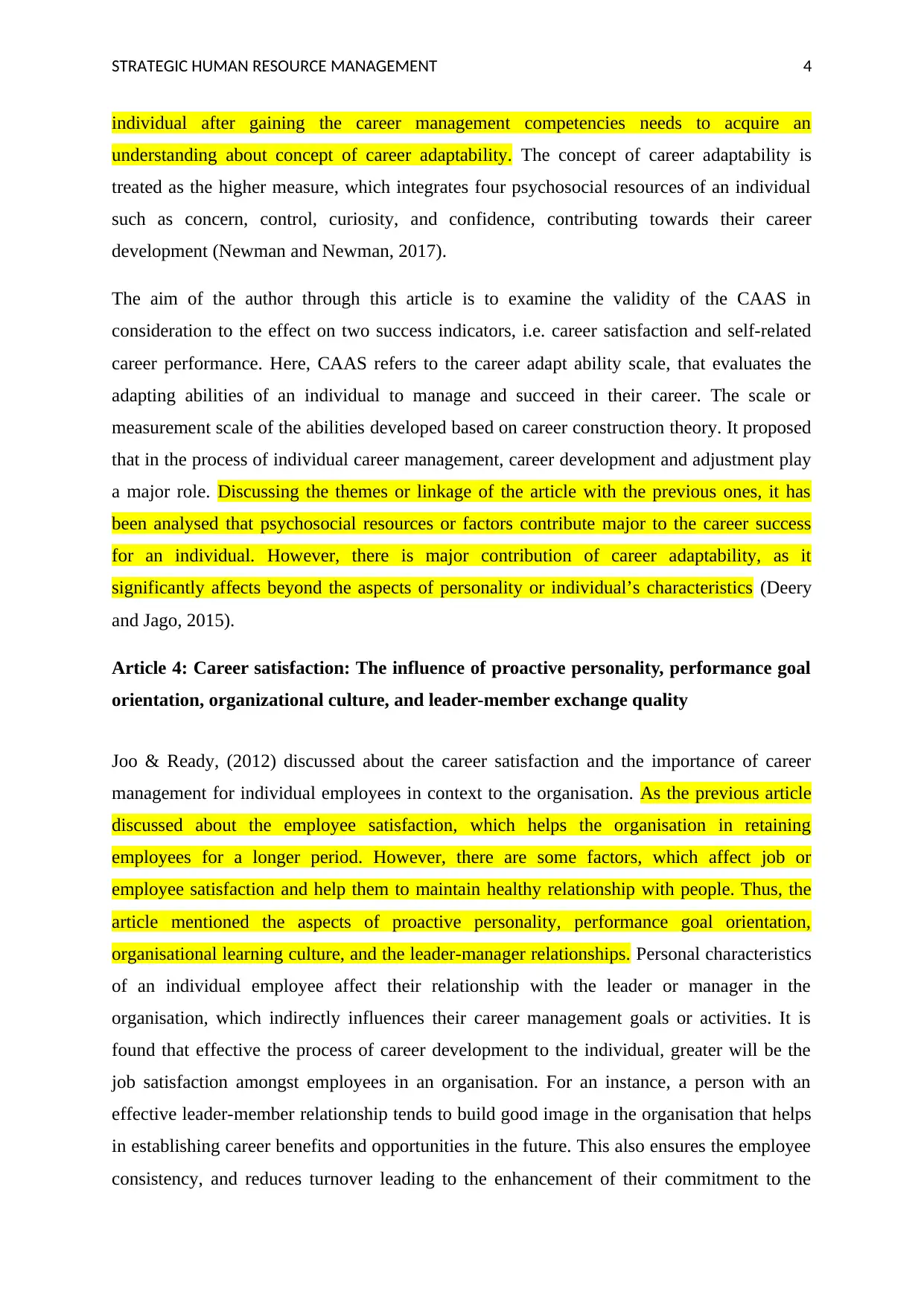
STRATEGIC HUMAN RESOURCE MANAGEMENT 4
individual after gaining the career management competencies needs to acquire an
understanding about concept of career adaptability. The concept of career adaptability is
treated as the higher measure, which integrates four psychosocial resources of an individual
such as concern, control, curiosity, and confidence, contributing towards their career
development (Newman and Newman, 2017).
The aim of the author through this article is to examine the validity of the CAAS in
consideration to the effect on two success indicators, i.e. career satisfaction and self-related
career performance. Here, CAAS refers to the career adapt ability scale, that evaluates the
adapting abilities of an individual to manage and succeed in their career. The scale or
measurement scale of the abilities developed based on career construction theory. It proposed
that in the process of individual career management, career development and adjustment play
a major role. Discussing the themes or linkage of the article with the previous ones, it has
been analysed that psychosocial resources or factors contribute major to the career success
for an individual. However, there is major contribution of career adaptability, as it
significantly affects beyond the aspects of personality or individual’s characteristics (Deery
and Jago, 2015).
Article 4: Career satisfaction: The influence of proactive personality, performance goal
orientation, organizational culture, and leader-member exchange quality
Joo & Ready, (2012) discussed about the career satisfaction and the importance of career
management for individual employees in context to the organisation. As the previous article
discussed about the employee satisfaction, which helps the organisation in retaining
employees for a longer period. However, there are some factors, which affect job or
employee satisfaction and help them to maintain healthy relationship with people. Thus, the
article mentioned the aspects of proactive personality, performance goal orientation,
organisational learning culture, and the leader-manager relationships. Personal characteristics
of an individual employee affect their relationship with the leader or manager in the
organisation, which indirectly influences their career management goals or activities. It is
found that effective the process of career development to the individual, greater will be the
job satisfaction amongst employees in an organisation. For an instance, a person with an
effective leader-member relationship tends to build good image in the organisation that helps
in establishing career benefits and opportunities in the future. This also ensures the employee
consistency, and reduces turnover leading to the enhancement of their commitment to the
individual after gaining the career management competencies needs to acquire an
understanding about concept of career adaptability. The concept of career adaptability is
treated as the higher measure, which integrates four psychosocial resources of an individual
such as concern, control, curiosity, and confidence, contributing towards their career
development (Newman and Newman, 2017).
The aim of the author through this article is to examine the validity of the CAAS in
consideration to the effect on two success indicators, i.e. career satisfaction and self-related
career performance. Here, CAAS refers to the career adapt ability scale, that evaluates the
adapting abilities of an individual to manage and succeed in their career. The scale or
measurement scale of the abilities developed based on career construction theory. It proposed
that in the process of individual career management, career development and adjustment play
a major role. Discussing the themes or linkage of the article with the previous ones, it has
been analysed that psychosocial resources or factors contribute major to the career success
for an individual. However, there is major contribution of career adaptability, as it
significantly affects beyond the aspects of personality or individual’s characteristics (Deery
and Jago, 2015).
Article 4: Career satisfaction: The influence of proactive personality, performance goal
orientation, organizational culture, and leader-member exchange quality
Joo & Ready, (2012) discussed about the career satisfaction and the importance of career
management for individual employees in context to the organisation. As the previous article
discussed about the employee satisfaction, which helps the organisation in retaining
employees for a longer period. However, there are some factors, which affect job or
employee satisfaction and help them to maintain healthy relationship with people. Thus, the
article mentioned the aspects of proactive personality, performance goal orientation,
organisational learning culture, and the leader-manager relationships. Personal characteristics
of an individual employee affect their relationship with the leader or manager in the
organisation, which indirectly influences their career management goals or activities. It is
found that effective the process of career development to the individual, greater will be the
job satisfaction amongst employees in an organisation. For an instance, a person with an
effective leader-member relationship tends to build good image in the organisation that helps
in establishing career benefits and opportunities in the future. This also ensures the employee
consistency, and reduces turnover leading to the enhancement of their commitment to the
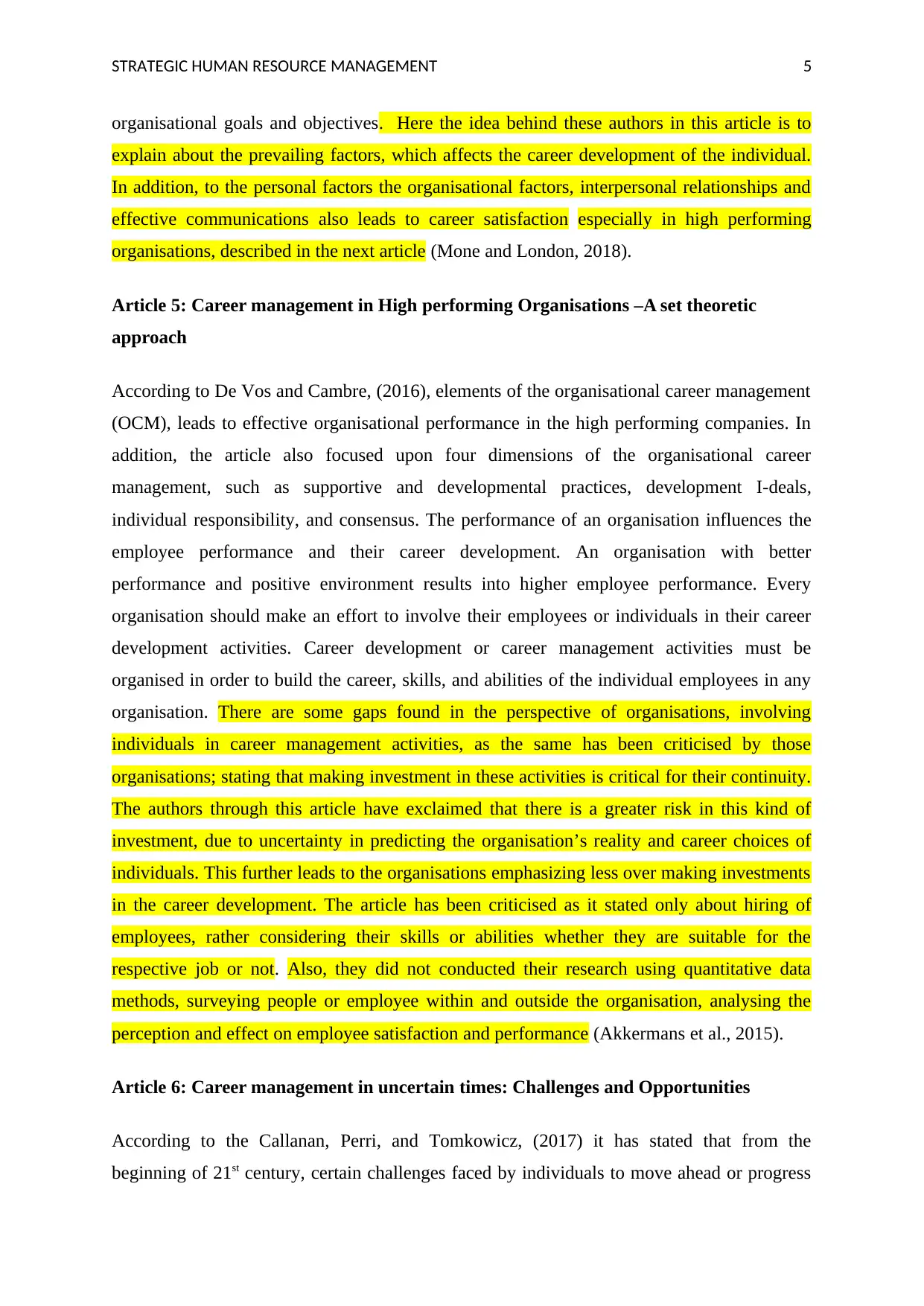
STRATEGIC HUMAN RESOURCE MANAGEMENT 5
organisational goals and objectives. Here the idea behind these authors in this article is to
explain about the prevailing factors, which affects the career development of the individual.
In addition, to the personal factors the organisational factors, interpersonal relationships and
effective communications also leads to career satisfaction especially in high performing
organisations, described in the next article (Mone and London, 2018).
Article 5: Career management in High performing Organisations –A set theoretic
approach
According to De Vos and Cambre, (2016), elements of the organisational career management
(OCM), leads to effective organisational performance in the high performing companies. In
addition, the article also focused upon four dimensions of the organisational career
management, such as supportive and developmental practices, development I-deals,
individual responsibility, and consensus. The performance of an organisation influences the
employee performance and their career development. An organisation with better
performance and positive environment results into higher employee performance. Every
organisation should make an effort to involve their employees or individuals in their career
development activities. Career development or career management activities must be
organised in order to build the career, skills, and abilities of the individual employees in any
organisation. There are some gaps found in the perspective of organisations, involving
individuals in career management activities, as the same has been criticised by those
organisations; stating that making investment in these activities is critical for their continuity.
The authors through this article have exclaimed that there is a greater risk in this kind of
investment, due to uncertainty in predicting the organisation’s reality and career choices of
individuals. This further leads to the organisations emphasizing less over making investments
in the career development. The article has been criticised as it stated only about hiring of
employees, rather considering their skills or abilities whether they are suitable for the
respective job or not. Also, they did not conducted their research using quantitative data
methods, surveying people or employee within and outside the organisation, analysing the
perception and effect on employee satisfaction and performance (Akkermans et al., 2015).
Article 6: Career management in uncertain times: Challenges and Opportunities
According to the Callanan, Perri, and Tomkowicz, (2017) it has stated that from the
beginning of 21st century, certain challenges faced by individuals to move ahead or progress
organisational goals and objectives. Here the idea behind these authors in this article is to
explain about the prevailing factors, which affects the career development of the individual.
In addition, to the personal factors the organisational factors, interpersonal relationships and
effective communications also leads to career satisfaction especially in high performing
organisations, described in the next article (Mone and London, 2018).
Article 5: Career management in High performing Organisations –A set theoretic
approach
According to De Vos and Cambre, (2016), elements of the organisational career management
(OCM), leads to effective organisational performance in the high performing companies. In
addition, the article also focused upon four dimensions of the organisational career
management, such as supportive and developmental practices, development I-deals,
individual responsibility, and consensus. The performance of an organisation influences the
employee performance and their career development. An organisation with better
performance and positive environment results into higher employee performance. Every
organisation should make an effort to involve their employees or individuals in their career
development activities. Career development or career management activities must be
organised in order to build the career, skills, and abilities of the individual employees in any
organisation. There are some gaps found in the perspective of organisations, involving
individuals in career management activities, as the same has been criticised by those
organisations; stating that making investment in these activities is critical for their continuity.
The authors through this article have exclaimed that there is a greater risk in this kind of
investment, due to uncertainty in predicting the organisation’s reality and career choices of
individuals. This further leads to the organisations emphasizing less over making investments
in the career development. The article has been criticised as it stated only about hiring of
employees, rather considering their skills or abilities whether they are suitable for the
respective job or not. Also, they did not conducted their research using quantitative data
methods, surveying people or employee within and outside the organisation, analysing the
perception and effect on employee satisfaction and performance (Akkermans et al., 2015).
Article 6: Career management in uncertain times: Challenges and Opportunities
According to the Callanan, Perri, and Tomkowicz, (2017) it has stated that from the
beginning of 21st century, certain challenges faced by individuals to move ahead or progress
⊘ This is a preview!⊘
Do you want full access?
Subscribe today to unlock all pages.

Trusted by 1+ million students worldwide
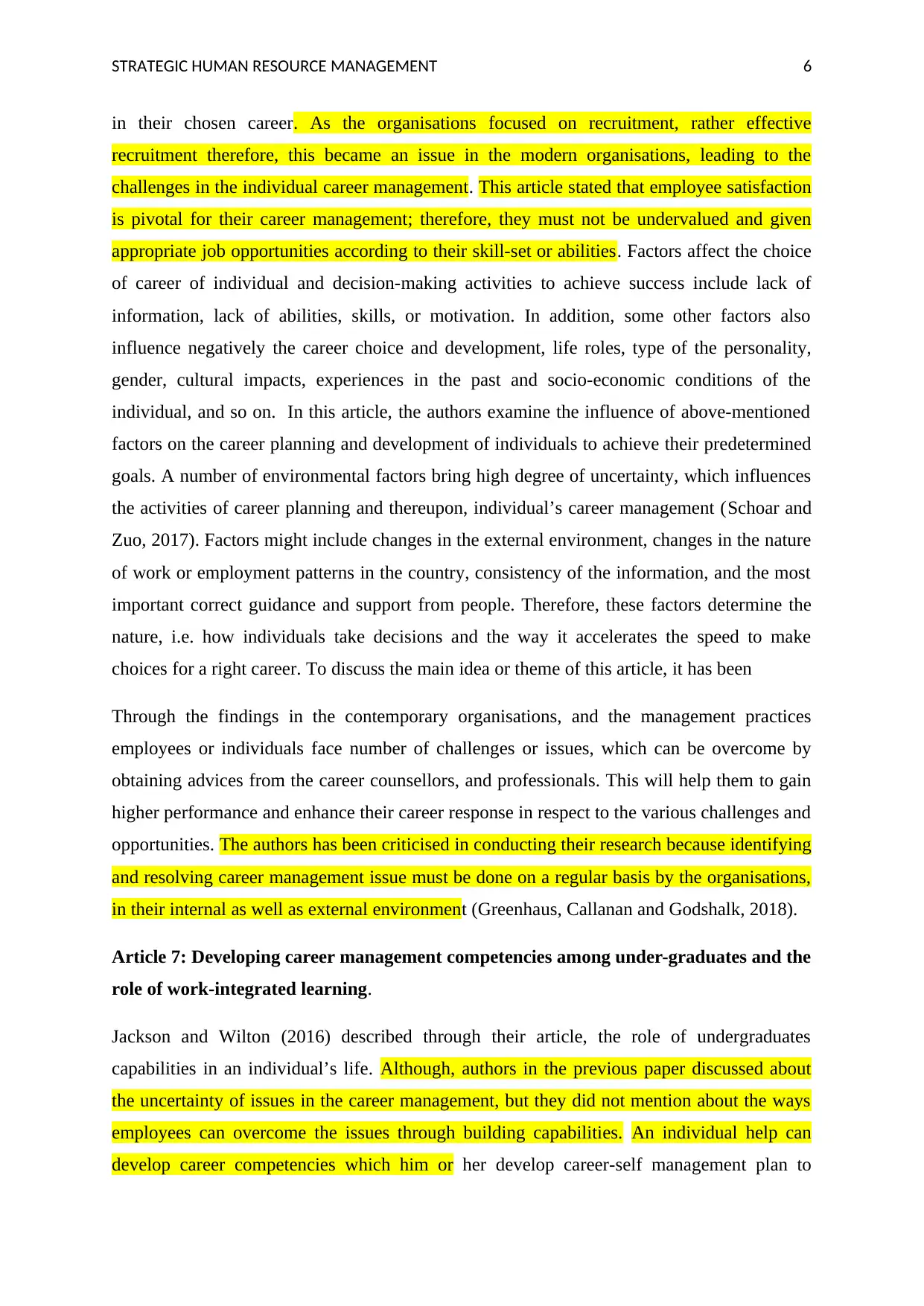
STRATEGIC HUMAN RESOURCE MANAGEMENT 6
in their chosen career. As the organisations focused on recruitment, rather effective
recruitment therefore, this became an issue in the modern organisations, leading to the
challenges in the individual career management. This article stated that employee satisfaction
is pivotal for their career management; therefore, they must not be undervalued and given
appropriate job opportunities according to their skill-set or abilities. Factors affect the choice
of career of individual and decision-making activities to achieve success include lack of
information, lack of abilities, skills, or motivation. In addition, some other factors also
influence negatively the career choice and development, life roles, type of the personality,
gender, cultural impacts, experiences in the past and socio-economic conditions of the
individual, and so on. In this article, the authors examine the influence of above-mentioned
factors on the career planning and development of individuals to achieve their predetermined
goals. A number of environmental factors bring high degree of uncertainty, which influences
the activities of career planning and thereupon, individual’s career management (Schoar and
Zuo, 2017). Factors might include changes in the external environment, changes in the nature
of work or employment patterns in the country, consistency of the information, and the most
important correct guidance and support from people. Therefore, these factors determine the
nature, i.e. how individuals take decisions and the way it accelerates the speed to make
choices for a right career. To discuss the main idea or theme of this article, it has been
Through the findings in the contemporary organisations, and the management practices
employees or individuals face number of challenges or issues, which can be overcome by
obtaining advices from the career counsellors, and professionals. This will help them to gain
higher performance and enhance their career response in respect to the various challenges and
opportunities. The authors has been criticised in conducting their research because identifying
and resolving career management issue must be done on a regular basis by the organisations,
in their internal as well as external environment (Greenhaus, Callanan and Godshalk, 2018).
Article 7: Developing career management competencies among under-graduates and the
role of work-integrated learning.
Jackson and Wilton (2016) described through their article, the role of undergraduates
capabilities in an individual’s life. Although, authors in the previous paper discussed about
the uncertainty of issues in the career management, but they did not mention about the ways
employees can overcome the issues through building capabilities. An individual help can
develop career competencies which him or her develop career-self management plan to
in their chosen career. As the organisations focused on recruitment, rather effective
recruitment therefore, this became an issue in the modern organisations, leading to the
challenges in the individual career management. This article stated that employee satisfaction
is pivotal for their career management; therefore, they must not be undervalued and given
appropriate job opportunities according to their skill-set or abilities. Factors affect the choice
of career of individual and decision-making activities to achieve success include lack of
information, lack of abilities, skills, or motivation. In addition, some other factors also
influence negatively the career choice and development, life roles, type of the personality,
gender, cultural impacts, experiences in the past and socio-economic conditions of the
individual, and so on. In this article, the authors examine the influence of above-mentioned
factors on the career planning and development of individuals to achieve their predetermined
goals. A number of environmental factors bring high degree of uncertainty, which influences
the activities of career planning and thereupon, individual’s career management (Schoar and
Zuo, 2017). Factors might include changes in the external environment, changes in the nature
of work or employment patterns in the country, consistency of the information, and the most
important correct guidance and support from people. Therefore, these factors determine the
nature, i.e. how individuals take decisions and the way it accelerates the speed to make
choices for a right career. To discuss the main idea or theme of this article, it has been
Through the findings in the contemporary organisations, and the management practices
employees or individuals face number of challenges or issues, which can be overcome by
obtaining advices from the career counsellors, and professionals. This will help them to gain
higher performance and enhance their career response in respect to the various challenges and
opportunities. The authors has been criticised in conducting their research because identifying
and resolving career management issue must be done on a regular basis by the organisations,
in their internal as well as external environment (Greenhaus, Callanan and Godshalk, 2018).
Article 7: Developing career management competencies among under-graduates and the
role of work-integrated learning.
Jackson and Wilton (2016) described through their article, the role of undergraduates
capabilities in an individual’s life. Although, authors in the previous paper discussed about
the uncertainty of issues in the career management, but they did not mention about the ways
employees can overcome the issues through building capabilities. An individual help can
develop career competencies which him or her develop career-self management plan to
Paraphrase This Document
Need a fresh take? Get an instant paraphrase of this document with our AI Paraphraser
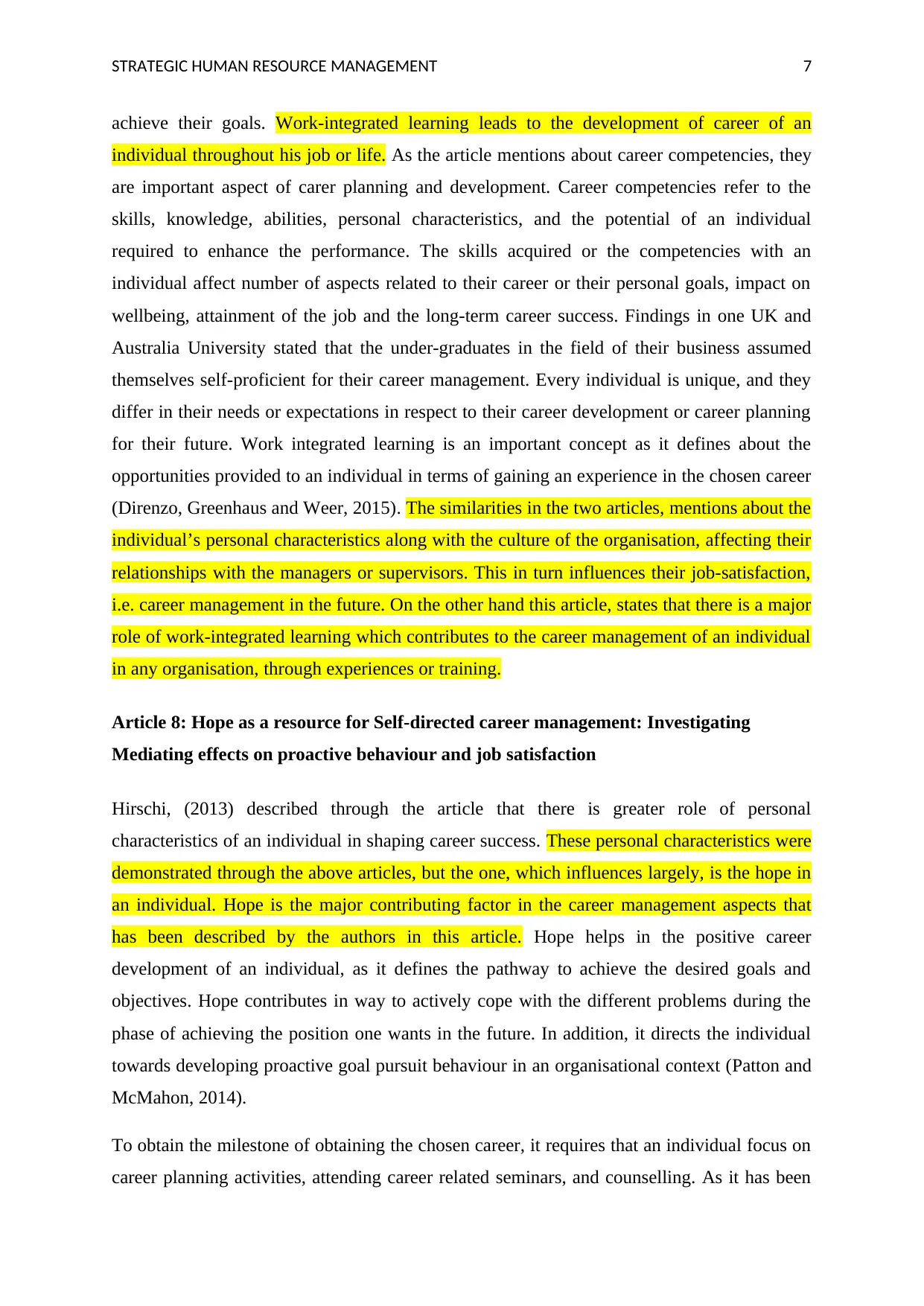
STRATEGIC HUMAN RESOURCE MANAGEMENT 7
achieve their goals. Work-integrated learning leads to the development of career of an
individual throughout his job or life. As the article mentions about career competencies, they
are important aspect of carer planning and development. Career competencies refer to the
skills, knowledge, abilities, personal characteristics, and the potential of an individual
required to enhance the performance. The skills acquired or the competencies with an
individual affect number of aspects related to their career or their personal goals, impact on
wellbeing, attainment of the job and the long-term career success. Findings in one UK and
Australia University stated that the under-graduates in the field of their business assumed
themselves self-proficient for their career management. Every individual is unique, and they
differ in their needs or expectations in respect to their career development or career planning
for their future. Work integrated learning is an important concept as it defines about the
opportunities provided to an individual in terms of gaining an experience in the chosen career
(Direnzo, Greenhaus and Weer, 2015). The similarities in the two articles, mentions about the
individual’s personal characteristics along with the culture of the organisation, affecting their
relationships with the managers or supervisors. This in turn influences their job-satisfaction,
i.e. career management in the future. On the other hand this article, states that there is a major
role of work-integrated learning which contributes to the career management of an individual
in any organisation, through experiences or training.
Article 8: Hope as a resource for Self-directed career management: Investigating
Mediating effects on proactive behaviour and job satisfaction
Hirschi, (2013) described through the article that there is greater role of personal
characteristics of an individual in shaping career success. These personal characteristics were
demonstrated through the above articles, but the one, which influences largely, is the hope in
an individual. Hope is the major contributing factor in the career management aspects that
has been described by the authors in this article. Hope helps in the positive career
development of an individual, as it defines the pathway to achieve the desired goals and
objectives. Hope contributes in way to actively cope with the different problems during the
phase of achieving the position one wants in the future. In addition, it directs the individual
towards developing proactive goal pursuit behaviour in an organisational context (Patton and
McMahon, 2014).
To obtain the milestone of obtaining the chosen career, it requires that an individual focus on
career planning activities, attending career related seminars, and counselling. As it has been
achieve their goals. Work-integrated learning leads to the development of career of an
individual throughout his job or life. As the article mentions about career competencies, they
are important aspect of carer planning and development. Career competencies refer to the
skills, knowledge, abilities, personal characteristics, and the potential of an individual
required to enhance the performance. The skills acquired or the competencies with an
individual affect number of aspects related to their career or their personal goals, impact on
wellbeing, attainment of the job and the long-term career success. Findings in one UK and
Australia University stated that the under-graduates in the field of their business assumed
themselves self-proficient for their career management. Every individual is unique, and they
differ in their needs or expectations in respect to their career development or career planning
for their future. Work integrated learning is an important concept as it defines about the
opportunities provided to an individual in terms of gaining an experience in the chosen career
(Direnzo, Greenhaus and Weer, 2015). The similarities in the two articles, mentions about the
individual’s personal characteristics along with the culture of the organisation, affecting their
relationships with the managers or supervisors. This in turn influences their job-satisfaction,
i.e. career management in the future. On the other hand this article, states that there is a major
role of work-integrated learning which contributes to the career management of an individual
in any organisation, through experiences or training.
Article 8: Hope as a resource for Self-directed career management: Investigating
Mediating effects on proactive behaviour and job satisfaction
Hirschi, (2013) described through the article that there is greater role of personal
characteristics of an individual in shaping career success. These personal characteristics were
demonstrated through the above articles, but the one, which influences largely, is the hope in
an individual. Hope is the major contributing factor in the career management aspects that
has been described by the authors in this article. Hope helps in the positive career
development of an individual, as it defines the pathway to achieve the desired goals and
objectives. Hope contributes in way to actively cope with the different problems during the
phase of achieving the position one wants in the future. In addition, it directs the individual
towards developing proactive goal pursuit behaviour in an organisational context (Patton and
McMahon, 2014).
To obtain the milestone of obtaining the chosen career, it requires that an individual focus on
career planning activities, attending career related seminars, and counselling. As it has been
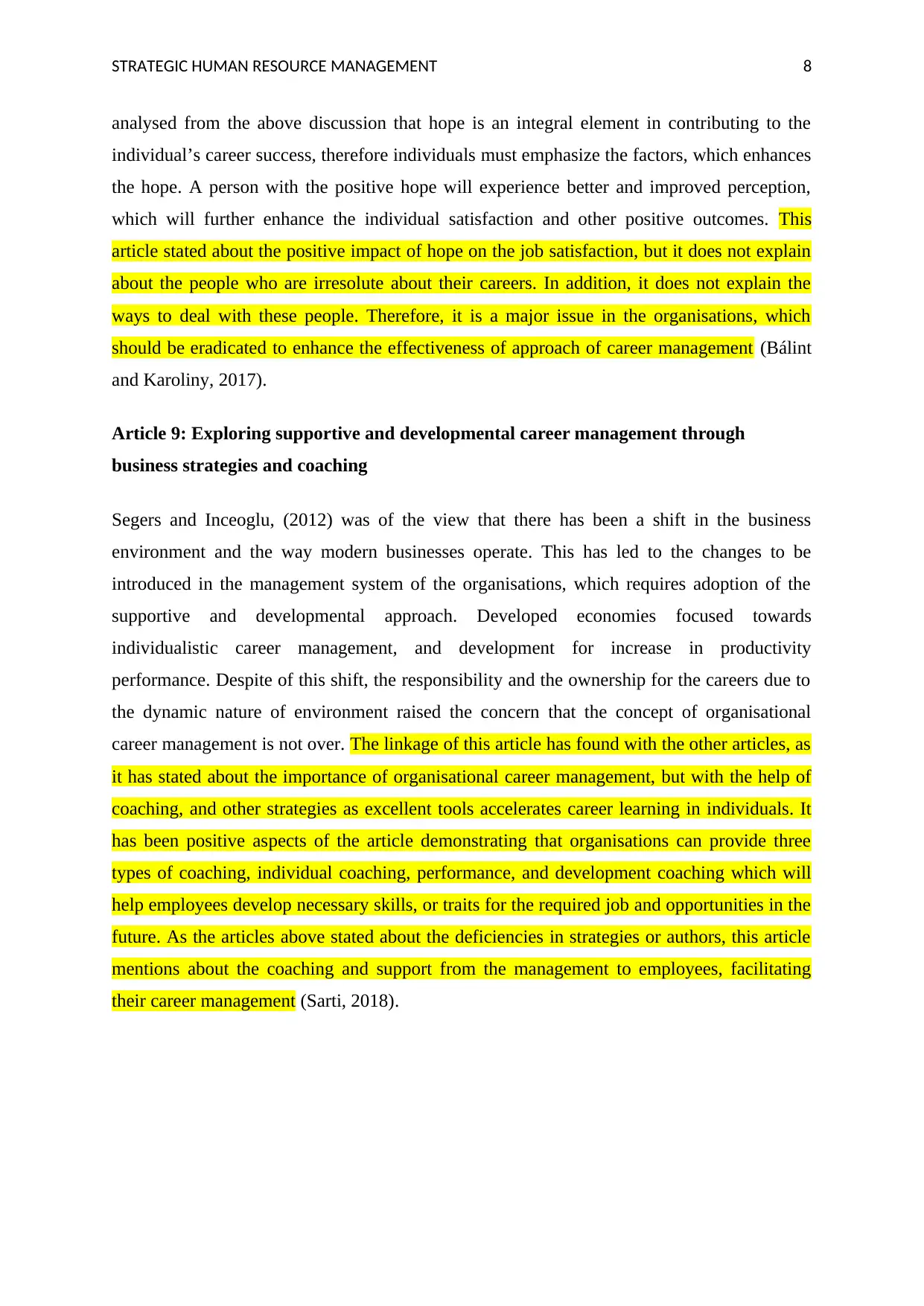
STRATEGIC HUMAN RESOURCE MANAGEMENT 8
analysed from the above discussion that hope is an integral element in contributing to the
individual’s career success, therefore individuals must emphasize the factors, which enhances
the hope. A person with the positive hope will experience better and improved perception,
which will further enhance the individual satisfaction and other positive outcomes. This
article stated about the positive impact of hope on the job satisfaction, but it does not explain
about the people who are irresolute about their careers. In addition, it does not explain the
ways to deal with these people. Therefore, it is a major issue in the organisations, which
should be eradicated to enhance the effectiveness of approach of career management (Bálint
and Karoliny, 2017).
Article 9: Exploring supportive and developmental career management through
business strategies and coaching
Segers and Inceoglu, (2012) was of the view that there has been a shift in the business
environment and the way modern businesses operate. This has led to the changes to be
introduced in the management system of the organisations, which requires adoption of the
supportive and developmental approach. Developed economies focused towards
individualistic career management, and development for increase in productivity
performance. Despite of this shift, the responsibility and the ownership for the careers due to
the dynamic nature of environment raised the concern that the concept of organisational
career management is not over. The linkage of this article has found with the other articles, as
it has stated about the importance of organisational career management, but with the help of
coaching, and other strategies as excellent tools accelerates career learning in individuals. It
has been positive aspects of the article demonstrating that organisations can provide three
types of coaching, individual coaching, performance, and development coaching which will
help employees develop necessary skills, or traits for the required job and opportunities in the
future. As the articles above stated about the deficiencies in strategies or authors, this article
mentions about the coaching and support from the management to employees, facilitating
their career management (Sarti, 2018).
analysed from the above discussion that hope is an integral element in contributing to the
individual’s career success, therefore individuals must emphasize the factors, which enhances
the hope. A person with the positive hope will experience better and improved perception,
which will further enhance the individual satisfaction and other positive outcomes. This
article stated about the positive impact of hope on the job satisfaction, but it does not explain
about the people who are irresolute about their careers. In addition, it does not explain the
ways to deal with these people. Therefore, it is a major issue in the organisations, which
should be eradicated to enhance the effectiveness of approach of career management (Bálint
and Karoliny, 2017).
Article 9: Exploring supportive and developmental career management through
business strategies and coaching
Segers and Inceoglu, (2012) was of the view that there has been a shift in the business
environment and the way modern businesses operate. This has led to the changes to be
introduced in the management system of the organisations, which requires adoption of the
supportive and developmental approach. Developed economies focused towards
individualistic career management, and development for increase in productivity
performance. Despite of this shift, the responsibility and the ownership for the careers due to
the dynamic nature of environment raised the concern that the concept of organisational
career management is not over. The linkage of this article has found with the other articles, as
it has stated about the importance of organisational career management, but with the help of
coaching, and other strategies as excellent tools accelerates career learning in individuals. It
has been positive aspects of the article demonstrating that organisations can provide three
types of coaching, individual coaching, performance, and development coaching which will
help employees develop necessary skills, or traits for the required job and opportunities in the
future. As the articles above stated about the deficiencies in strategies or authors, this article
mentions about the coaching and support from the management to employees, facilitating
their career management (Sarti, 2018).
⊘ This is a preview!⊘
Do you want full access?
Subscribe today to unlock all pages.

Trusted by 1+ million students worldwide
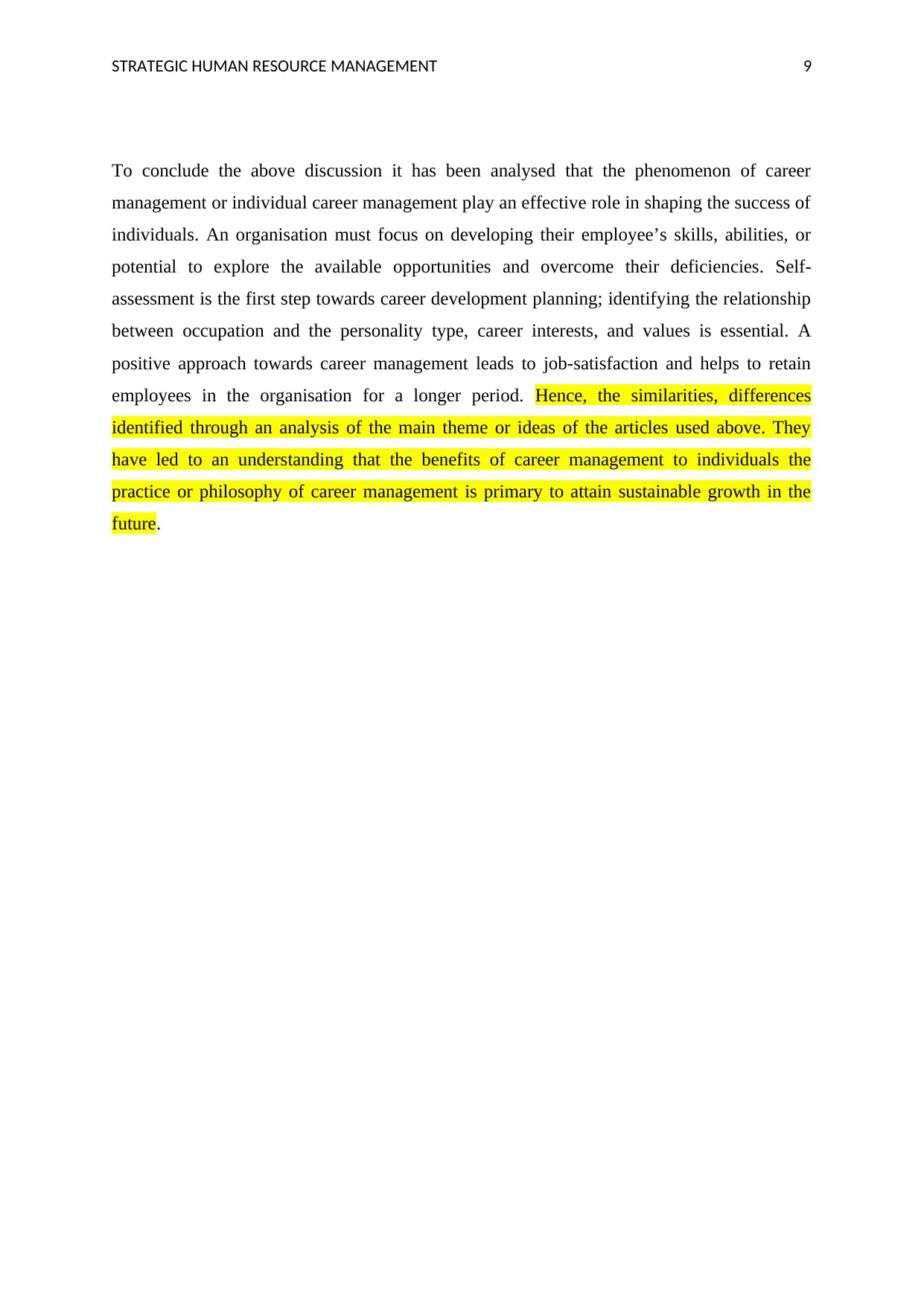
STRATEGIC HUMAN RESOURCE MANAGEMENT 9
To conclude the above discussion it has been analysed that the phenomenon of career
management or individual career management play an effective role in shaping the success of
individuals. An organisation must focus on developing their employee’s skills, abilities, or
potential to explore the available opportunities and overcome their deficiencies. Self-
assessment is the first step towards career development planning; identifying the relationship
between occupation and the personality type, career interests, and values is essential. A
positive approach towards career management leads to job-satisfaction and helps to retain
employees in the organisation for a longer period. Hence, the similarities, differences
identified through an analysis of the main theme or ideas of the articles used above. They
have led to an understanding that the benefits of career management to individuals the
practice or philosophy of career management is primary to attain sustainable growth in the
future.
To conclude the above discussion it has been analysed that the phenomenon of career
management or individual career management play an effective role in shaping the success of
individuals. An organisation must focus on developing their employee’s skills, abilities, or
potential to explore the available opportunities and overcome their deficiencies. Self-
assessment is the first step towards career development planning; identifying the relationship
between occupation and the personality type, career interests, and values is essential. A
positive approach towards career management leads to job-satisfaction and helps to retain
employees in the organisation for a longer period. Hence, the similarities, differences
identified through an analysis of the main theme or ideas of the articles used above. They
have led to an understanding that the benefits of career management to individuals the
practice or philosophy of career management is primary to attain sustainable growth in the
future.
Paraphrase This Document
Need a fresh take? Get an instant paraphrase of this document with our AI Paraphraser
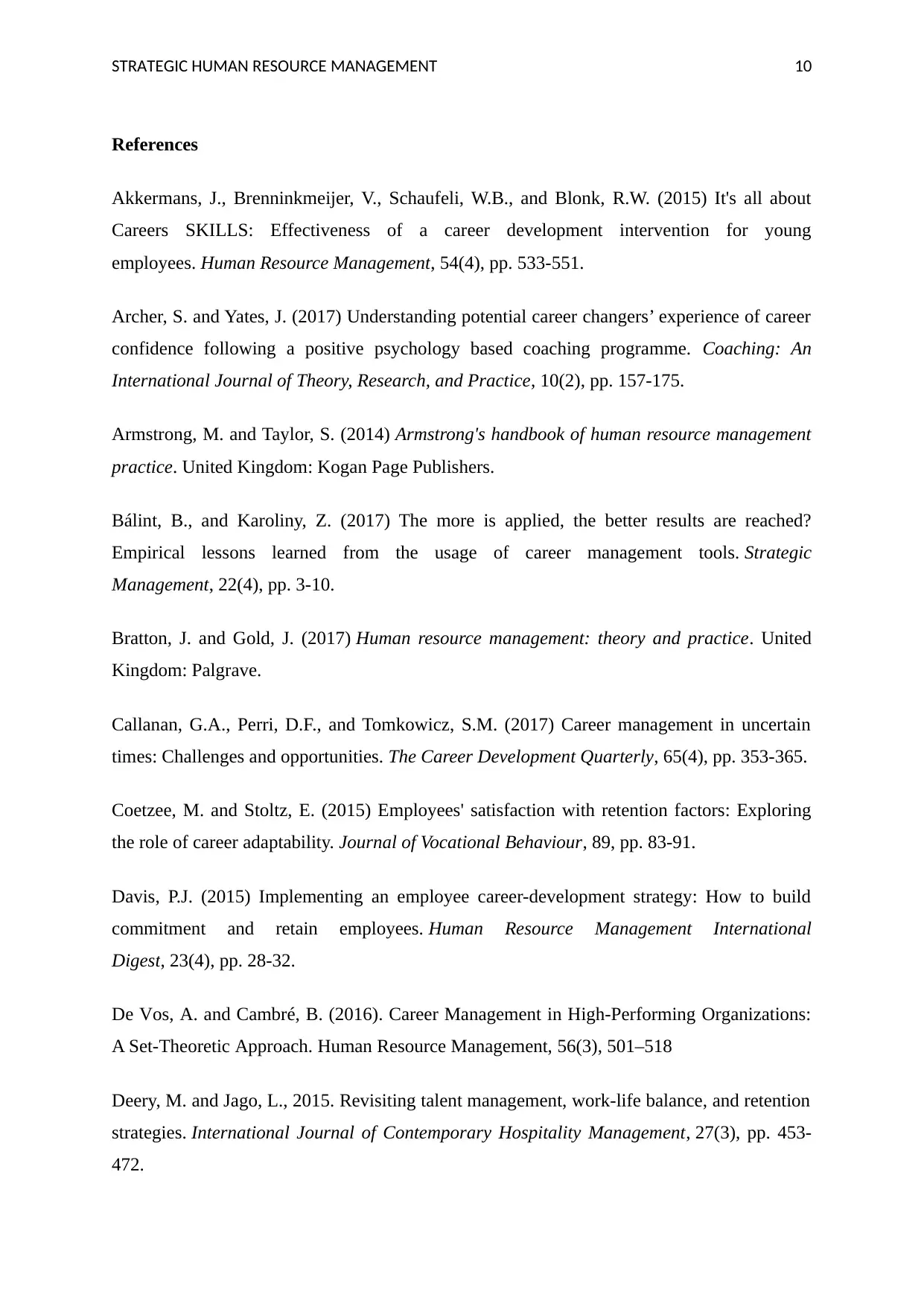
STRATEGIC HUMAN RESOURCE MANAGEMENT 10
References
Akkermans, J., Brenninkmeijer, V., Schaufeli, W.B., and Blonk, R.W. (2015) It's all about
Careers SKILLS: Effectiveness of a career development intervention for young
employees. Human Resource Management, 54(4), pp. 533-551.
Archer, S. and Yates, J. (2017) Understanding potential career changers’ experience of career
confidence following a positive psychology based coaching programme. Coaching: An
International Journal of Theory, Research, and Practice, 10(2), pp. 157-175.
Armstrong, M. and Taylor, S. (2014) Armstrong's handbook of human resource management
practice. United Kingdom: Kogan Page Publishers.
Bálint, B., and Karoliny, Z. (2017) The more is applied, the better results are reached?
Empirical lessons learned from the usage of career management tools. Strategic
Management, 22(4), pp. 3-10.
Bratton, J. and Gold, J. (2017) Human resource management: theory and practice. United
Kingdom: Palgrave.
Callanan, G.A., Perri, D.F., and Tomkowicz, S.M. (2017) Career management in uncertain
times: Challenges and opportunities. The Career Development Quarterly, 65(4), pp. 353-365.
Coetzee, M. and Stoltz, E. (2015) Employees' satisfaction with retention factors: Exploring
the role of career adaptability. Journal of Vocational Behaviour, 89, pp. 83-91.
Davis, P.J. (2015) Implementing an employee career-development strategy: How to build
commitment and retain employees. Human Resource Management International
Digest, 23(4), pp. 28-32.
De Vos, A. and Cambré, B. (2016). Career Management in High-Performing Organizations:
A Set-Theoretic Approach. Human Resource Management, 56(3), 501–518
Deery, M. and Jago, L., 2015. Revisiting talent management, work-life balance, and retention
strategies. International Journal of Contemporary Hospitality Management, 27(3), pp. 453-
472.
References
Akkermans, J., Brenninkmeijer, V., Schaufeli, W.B., and Blonk, R.W. (2015) It's all about
Careers SKILLS: Effectiveness of a career development intervention for young
employees. Human Resource Management, 54(4), pp. 533-551.
Archer, S. and Yates, J. (2017) Understanding potential career changers’ experience of career
confidence following a positive psychology based coaching programme. Coaching: An
International Journal of Theory, Research, and Practice, 10(2), pp. 157-175.
Armstrong, M. and Taylor, S. (2014) Armstrong's handbook of human resource management
practice. United Kingdom: Kogan Page Publishers.
Bálint, B., and Karoliny, Z. (2017) The more is applied, the better results are reached?
Empirical lessons learned from the usage of career management tools. Strategic
Management, 22(4), pp. 3-10.
Bratton, J. and Gold, J. (2017) Human resource management: theory and practice. United
Kingdom: Palgrave.
Callanan, G.A., Perri, D.F., and Tomkowicz, S.M. (2017) Career management in uncertain
times: Challenges and opportunities. The Career Development Quarterly, 65(4), pp. 353-365.
Coetzee, M. and Stoltz, E. (2015) Employees' satisfaction with retention factors: Exploring
the role of career adaptability. Journal of Vocational Behaviour, 89, pp. 83-91.
Davis, P.J. (2015) Implementing an employee career-development strategy: How to build
commitment and retain employees. Human Resource Management International
Digest, 23(4), pp. 28-32.
De Vos, A. and Cambré, B. (2016). Career Management in High-Performing Organizations:
A Set-Theoretic Approach. Human Resource Management, 56(3), 501–518
Deery, M. and Jago, L., 2015. Revisiting talent management, work-life balance, and retention
strategies. International Journal of Contemporary Hospitality Management, 27(3), pp. 453-
472.
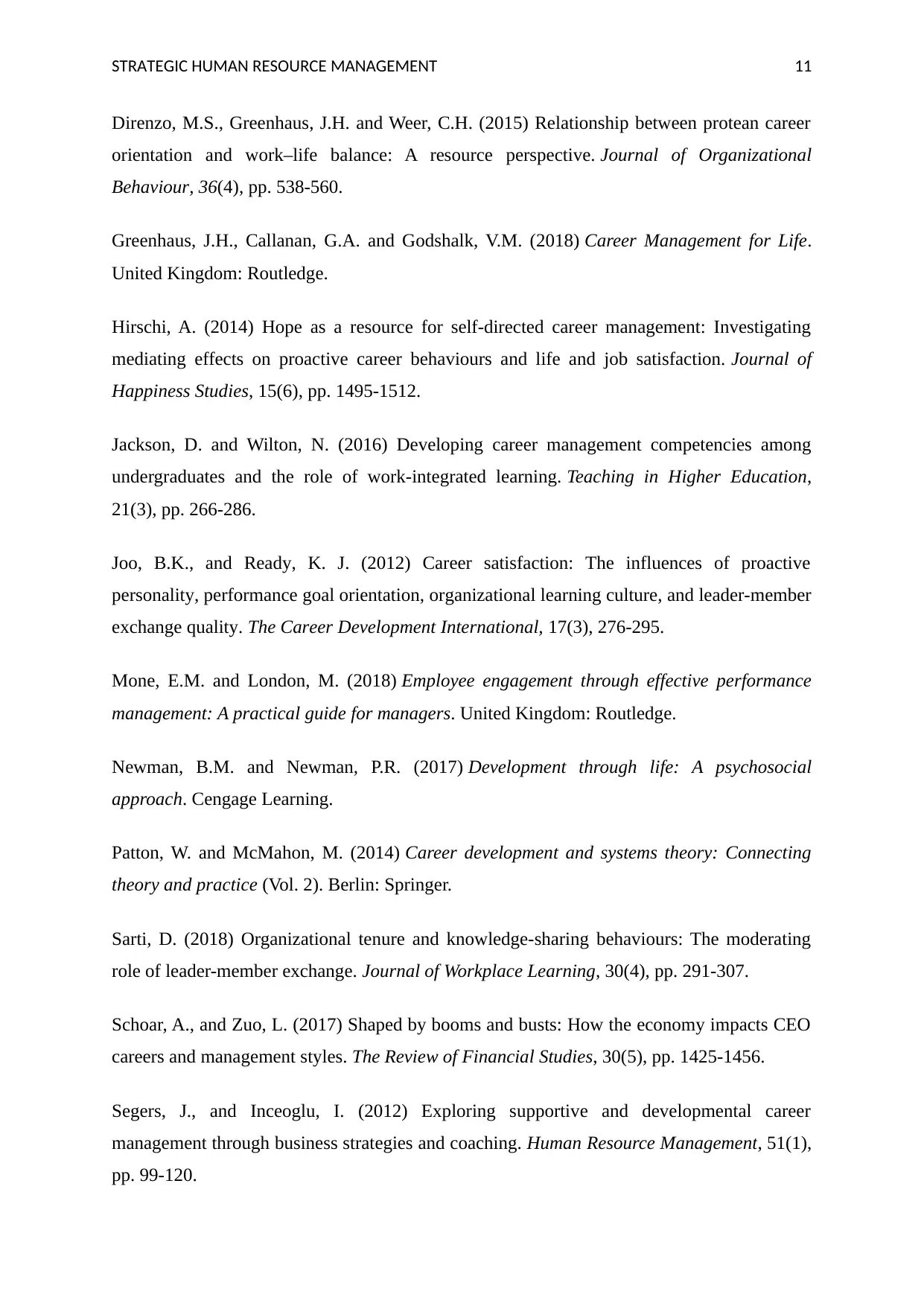
STRATEGIC HUMAN RESOURCE MANAGEMENT 11
Direnzo, M.S., Greenhaus, J.H. and Weer, C.H. (2015) Relationship between protean career
orientation and work–life balance: A resource perspective. Journal of Organizational
Behaviour, 36(4), pp. 538-560.
Greenhaus, J.H., Callanan, G.A. and Godshalk, V.M. (2018) Career Management for Life.
United Kingdom: Routledge.
Hirschi, A. (2014) Hope as a resource for self-directed career management: Investigating
mediating effects on proactive career behaviours and life and job satisfaction. Journal of
Happiness Studies, 15(6), pp. 1495-1512.
Jackson, D. and Wilton, N. (2016) Developing career management competencies among
undergraduates and the role of work-integrated learning. Teaching in Higher Education,
21(3), pp. 266-286.
Joo, B.K., and Ready, K. J. (2012) Career satisfaction: The influences of proactive
personality, performance goal orientation, organizational learning culture, and leader-member
exchange quality. The Career Development International, 17(3), 276-295.
Mone, E.M. and London, M. (2018) Employee engagement through effective performance
management: A practical guide for managers. United Kingdom: Routledge.
Newman, B.M. and Newman, P.R. (2017) Development through life: A psychosocial
approach. Cengage Learning.
Patton, W. and McMahon, M. (2014) Career development and systems theory: Connecting
theory and practice (Vol. 2). Berlin: Springer.
Sarti, D. (2018) Organizational tenure and knowledge-sharing behaviours: The moderating
role of leader-member exchange. Journal of Workplace Learning, 30(4), pp. 291-307.
Schoar, A., and Zuo, L. (2017) Shaped by booms and busts: How the economy impacts CEO
careers and management styles. The Review of Financial Studies, 30(5), pp. 1425-1456.
Segers, J., and Inceoglu, I. (2012) Exploring supportive and developmental career
management through business strategies and coaching. Human Resource Management, 51(1),
pp. 99-120.
Direnzo, M.S., Greenhaus, J.H. and Weer, C.H. (2015) Relationship between protean career
orientation and work–life balance: A resource perspective. Journal of Organizational
Behaviour, 36(4), pp. 538-560.
Greenhaus, J.H., Callanan, G.A. and Godshalk, V.M. (2018) Career Management for Life.
United Kingdom: Routledge.
Hirschi, A. (2014) Hope as a resource for self-directed career management: Investigating
mediating effects on proactive career behaviours and life and job satisfaction. Journal of
Happiness Studies, 15(6), pp. 1495-1512.
Jackson, D. and Wilton, N. (2016) Developing career management competencies among
undergraduates and the role of work-integrated learning. Teaching in Higher Education,
21(3), pp. 266-286.
Joo, B.K., and Ready, K. J. (2012) Career satisfaction: The influences of proactive
personality, performance goal orientation, organizational learning culture, and leader-member
exchange quality. The Career Development International, 17(3), 276-295.
Mone, E.M. and London, M. (2018) Employee engagement through effective performance
management: A practical guide for managers. United Kingdom: Routledge.
Newman, B.M. and Newman, P.R. (2017) Development through life: A psychosocial
approach. Cengage Learning.
Patton, W. and McMahon, M. (2014) Career development and systems theory: Connecting
theory and practice (Vol. 2). Berlin: Springer.
Sarti, D. (2018) Organizational tenure and knowledge-sharing behaviours: The moderating
role of leader-member exchange. Journal of Workplace Learning, 30(4), pp. 291-307.
Schoar, A., and Zuo, L. (2017) Shaped by booms and busts: How the economy impacts CEO
careers and management styles. The Review of Financial Studies, 30(5), pp. 1425-1456.
Segers, J., and Inceoglu, I. (2012) Exploring supportive and developmental career
management through business strategies and coaching. Human Resource Management, 51(1),
pp. 99-120.
⊘ This is a preview!⊘
Do you want full access?
Subscribe today to unlock all pages.

Trusted by 1+ million students worldwide
1 out of 13
Related Documents
Your All-in-One AI-Powered Toolkit for Academic Success.
+13062052269
info@desklib.com
Available 24*7 on WhatsApp / Email
![[object Object]](/_next/static/media/star-bottom.7253800d.svg)
Unlock your academic potential
Copyright © 2020–2026 A2Z Services. All Rights Reserved. Developed and managed by ZUCOL.




